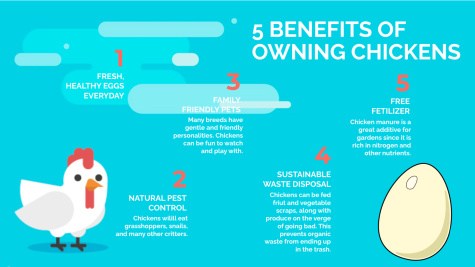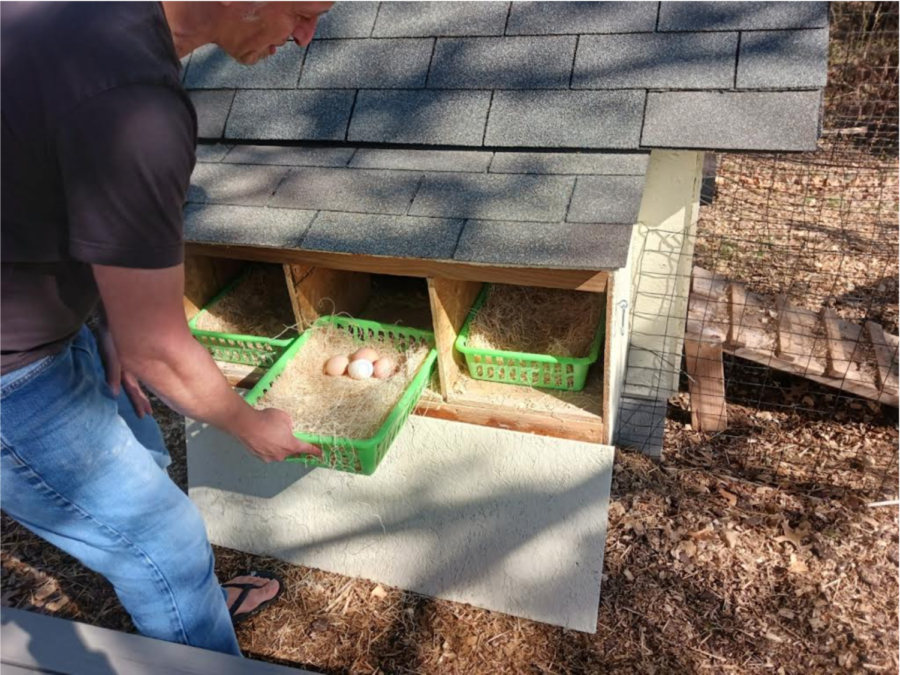Chicken before the egg…
COVID, inflation prompt owners to expand their flocks
Zach Avila, architectural engineering teacher, removes eggs from his chicken coop. He said they often have an abundance of eggs, and they usually give some away to friends and family.
March 14, 2023
Zach Avila, architectural engineering teacher, had always thought about getting chickens.
“My wife and I had been discussing it forever,” Avila said. “We’ve also had friends and neighbors that have had chickens.”
About a year ago, Avila and his wife offered to “babysit” a friend’s two recently adopted chickens while they and their family were out of the country. With the friend’s urging, this supposedly brief babysitting arrangement soon became permanent, and suddenly, the Avilas had chickens.
“We ended up with a total of five,” Avila said. “They’re all different breeds, so they’re different colors and easily recognizable.”
Within the last two months, Avila said all five hens—Cha Cha, Chicky, Lola, Lucy and Ruby—have been producing eggs. Each chicken lays four to five eggs each day, amounting to an average total of 30 eggs per week.
“We’re just fortunate that we don’t have to buy them,” Avila said. “Just out of curiosity, I’ll look at the price at the grocery store to see how expensive eggs are, and it is quite surprising that they’re two to three times more expensive than they used to be.”
Inflation and supply chain issues have been cited as contributing factors to the explosion in prices; however, the avian flu has been the primary factor, causing the deaths of millions of chickens. Nearly 60

million chickens have been affected by the virus, according to the US Department of Agriculture.
With egg prices jumping from under $2 at the start of last year to more than $4 this year, chicken hatcheries across the country have seen a massive increase in orders.
Tom Watkins, president of Murray McMurray Hatchery in Iowa, said they have had almost 1,000 phone calls a day.
About 75% of McMurray’s orders are placed online, and the rest are placed over the phone. Collectively, Watkins said the hatchery has been placing roughly 1,000 orders for eggs each day.
Just out of curiosity, I’ll look at the price at the grocery store to see how expensive eggs are, and it is quite surprising that they’re two to three times more expensive than they used to be.
— Zach Avila
“This is a little bit earlier than usual for our peak season because we’ve seen a rise in early orders,” Watkins said.
Watkins said COVID-19 has been part of the reason for this increase in egg orders.
“People were getting chickens because they always wanted to, and now they had time,” Watkins said.
This year, motivated by high egg prices in stores, Watkins said many existing customers decided to expand their flocks.
“It’s not necessarily new people. It’s people who come to take that next step from just raising chickens for fun, a hobby or for their own use,” Watkins said. “Now’s an opportunity for them to try to sell something and to supply neighbors with these eggs.”
Nevaeh Kerber, sophomore, has had chickens on and off since she was 6 years old. Her family now has seven chickens, along with the other animals on their farm, including pigs, horses, bunnies, a goat, a cow, a donkey, giant tortoises, snakes, a fallow deer, a mini ostrich and a zebra.
“We started hatching eggs over COVID, so the chickens that we have now we actually hatched,” Kerber said.
Their chickens each produce an egg almost every day, which amounts to nearly 50 eggs weekly.
We give a lot away because there’s just too many.
— Nevaeh Kerber
“We give a lot away because there’s just too many,” Kerber said. “The price of chicken food has increased, but we haven’t had to buy eggs, so that’s been nice.”
Chickens are not without their costs. Along with chicken feed, they also require scratch, a mixture of whole grains, seeds and legumes; grit, small rocks for digestion; oyster shells, a source of calcium, and bedding for their coop that needs to be replaced consistently.
Keeping them warm at this time of year also proves a challenge.
Avila said his family’s primary motive is the joy that comes with raising them.
“For us, they’re just a bunch of pets,” Avila said. “I wouldn’t recommend chickens for anybody who just wants to save money. I’d recommend it if they like animals and want to grow their own food.”
This story was originally published on Marquette Messenger on March 10, 2023.































![IN THE SPOTLIGHT: Junior Zalie Mann performs “I Love to Cry at Weddings,” an ensemble piece from the fall musical Sweet Charity, to prospective students during the Fine Arts Showcase on Wednesday, Nov. 8. The showcase is a compilation of performances and demonstrations from each fine arts strand offered at McCallum. This show is put on so that prospective students can see if they are interested in joining an academy or major.
Sweet Charity originally ran the weekends of Sept. 28 and Oct. 8, but made a comeback for the Fine Arts Showcase.
“[Being at the front in the spotlight] is my favorite part of the whole dance, so I was super happy to be on stage performing and smiling at the audience,” Mann said.
Mann performed in both the musical theatre performance and dance excerpt “Ethereal,” a contemporary piece choreographed by the new dance director Terrance Carson, in the showcase. With also being a dance ambassador, Mann got to talk about what MAC dance is, her experience and answer any questions the aspiring arts majors and their parents may have.
Caption by Maya Tackett.](https://bestofsno.com/wp-content/uploads/2024/02/53321803427_47cd17fe70_o-1-1200x800.jpg)
![SPREADING THE JOY: Sophomore Chim Becker poses with sophomores Cozbi Sims and Lou Davidson while manning a table at the Hispanic Heritage treat day during lunch of Sept 28. Becker is a part of the students of color alliance, who put together the activity to raise money for their club.
“It [the stand] was really fun because McCallum has a lot of latino kids,” Becker said. “And I think it was nice that I could share the stuff that I usually just have at home with people who have never tried it before.”
Becker recognizes the importance of celebrating Hispanic heritage at Mac.
“I think its important to celebrate,” Becker said. “Because our culture is awesome and super cool, and everybody should be able to learn about other cultures of the world.”
Caption by JoJo Barnard.](https://bestofsno.com/wp-content/uploads/2024/01/53221601352_4127a81c41_o-1200x675.jpg)















